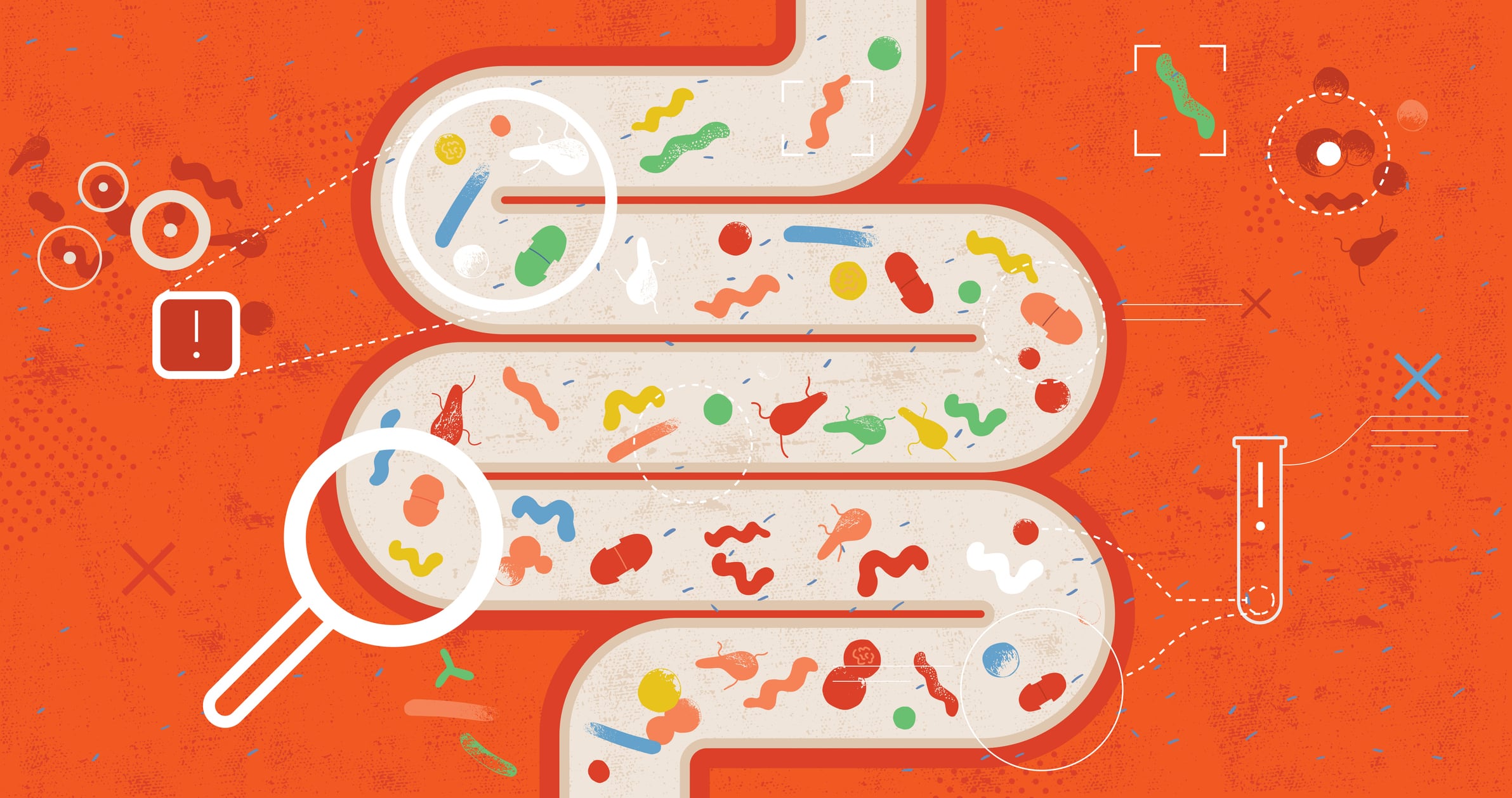Within a complex, cooperative and cross-feeding environment, researchers are taking a closer look at how nutrients affect the gut microbiota to shape composition, diversity and metabolic function.
This includes an increasingly detailed dissection of the mechanisms of action and interaction across multiple organ systems to explore how differences in chemical communication between nutrients, gut microbes and host cells might explain inter-individual responses to interventions across populations.
Below a look at some of the latest science delving into the many compounds—from a kimchi and sourdough-derived postbiotics and breastmilk prebiotic to sugar kelp, mushrooms and outcome-specific probiotics.
Konjac glucomannan may support intestinal health in elite athletes
Konjac glucomannan (KGM) supplementation over eight weeks has been shown to significantly improve constipation symptoms in elite athletes by enhancing gut microbial diversity.
In a double-blind randomized controlled trial involving 48 elite male Taekwondo athletes, those receiving KGM experienced improvements in constipation symptoms and quality of life compared to a placebo group. The study found that KGM increased beneficial gut bacteria and altered metabolic pathways, suggesting dietary fiber as a non-pharmacologic intervention for athletes with gastrointestinal dysfunction.
“KGM supplementation appears to offer a clinically meaningful approach to alleviating functional constipation, potentially through the enhancement of gut microbial diversity and function,” wrote scientists from Southwest University in China in the European Journal of Nutrition.
Postbiotics from kimchi and sourdough may protect eyes from blue-light damage
Writing in the journal Nutrients, researchers from China explored the protective effects of postbiotics derived from Limosilactobacillus fermentum IOB802 and Lactobacillus plantarum IOB602 against blue-light-induced retinal injury.
These postbiotics, obtained from kimchi and sourdough, demonstrated antioxidant, anti-inflammatory and microbiota-modulating properties. The study suggested that these mechanisms could mitigate oxidative stress and inflammation, potentially preventing retinal degeneration.
Validation in human cell lines and mouse models indicated that the IOB802 strain was particularly effective in preserving retinal health and modulating the gut microbiome to enhance SCFA production and suppress harmful signaling pathways.

B. longum strain may modulate immunity and neuroprotective pathways
Bifidobacterium longum 1714 influences the immune system by inducing anti-inflammatory compounds like IL-10 and reducing proinflammatory compounds, while also affecting neuroprotective pathways through tryptophan metabolism.
“Our results show that B. longum 1714 has significant effects on the innate immune system and these effects may be mediated partially via cell surface associated macromolecules and secreted immunomodulatory and neuroprotective metabolites,” wrote researchers led by David Groeger, innovation science manager at Novonesis, which commercializes the strain as ProbioBrain.
The strain, which won the 2025 Mind and Mood Ingredient of the year at the NutraIngredients-Europe Awards, has been shown to improve sleep, stress response and cognitive health, with research identifying specific metabolites such as Indole-3-lactic acid and exopolysaccharide that mediate its gut-brain effects.
According to Groeger, the latest findings, published in Current Research in Microbial Sciences, underscore the strain’s impact on mental wellness and its potential for targeted psychobiotic development.
Breastmilk prebiotic may improve metabolism and boost cognition for older adults
A study published in Cell Reports Medicine examined the effects of 2′-fucosyllactose (2′-FL) supplementation on older adults over six weeks. It found that high doses of 2′-FL improved HDL cholesterol, insulin levels and the hormone FGF21, which regulates metabolism.
“These results demonstrate a potential impact of 2′-FL supplementation on cognitive function in human adults,” wrote the researchers, led by Stanford’s Dr. Justin Sonnenburg. “Previous work has shown that 2′-FL levels in breast milk are positively associated with cognitive development in human infants, and 2′-FL supplementation influences vagus-nerve-mediated memory adaptations in adult rodents.”
While not all participants responded to the treatment, those with increased Bifidobacterium levels showed enhanced cognitive performance. The research suggests that 2′-FL can beneficially modify the microbiota and influence systemic metabolism and cognition, highlighting its potential for brain health in aging populations.
Berry researchers strengthen gut link to better brain and heart health
At the 2025 Berry Health Benefits Symposium, researchers highlighted the significant role of berries, particularly their polyphenols called anthocyanins, in enhancing gut health and their potential impacts on brain and heart health.
“When we characterize the gut microbial community, we’re really trying to understand who is there and what they are doing,” said Johanna Lampe, PhD, RD, professor at the Public Health Sciences Division at the Fred Hutchinson Cancer Center. “The concentration and bioactivity of berries is actually highest in the gastrointestinal tract.”
Studies showed that anthocyanins could alter gene expression related to cognitive disorders like Alzheimer’s and improve gut microbiota diversity, especially in infants. Additionally, a combination of dietary interventions with physical activity in older adults demonstrated improved cognitive processing and cardiovascular health.
Massimo Iorizzo, PhD, professor at North Carolina State University, noted the importance of understanding the differences in gut microbial function among individuals as a major contributor to people’s inter-individual response to diet.

US infant microbiome study links personalized probiotic protocols to 83% lower eczema risk
A study published in Pediatric Allergy & Immunology by Tiny Health showed that personalized probiotic protocols, guided by microbiome testing, can reduce the risk of eczema in infants by 83%, particularly those born via C-section.
The study highlighted the importance of tailored probiotic supplementation based on individual microbiome profiles, leading to healthier gut development and a decrease in atopic conditions.
“What makes this study unique is its personalized approach—the intervention targets each baby’s individual microbiome, unlike the few studies out there on specific probiotics or formulas,” said. Cheryl Sew Hoy, CEO of Tiny Health.
She noted that 41.6% of babies in Tiny Health’s database were taking incorrect probiotics for their microbiome profile, while 77.6% of parents changed their baby’s probiotics after testing.
Resistant starch prebiotic may boost antioxidant and choline levels
Recent studies on Solnul, a resistant starch derived from potatoes, highlight its potential to enhance nutrient absorption and improve gut health.
In clinical trials, a daily intake of 3.5 grams of Solnul resulted in increased levels of essential nutrients such as choline, vitamin A and vitamin E, with a notable correlation to the presence of the Akkermansia microbe.
Additionally, Solnul supplementation was linked to improved choline metabolism without affecting TMAO levels, suggesting benefits for cardiovascular health.
“This work builds on our previously reported findings demonstrating that Solnul improves barrier function,” said Dr. Jason Bush, chief scientific officer at MSP Starch Products Inc.
Daily whole mushroom consumption bolsters prebiotic activity
A study published in the Journal of Functional Foods by researchers from Ghent University and M2 Ingredients highlighted that whole mushroom powders, specifically M2 Cordyceps 116 and Myco-Multi, exhibit enhanced prebiotic activity compared to the well-known prebiotic inulin.
The research demonstrated that these mushroom powders increased short-chain fatty acid production and enriched beneficial bacterial species in the gut, suggesting that their use as prebiotic ingredients provides additional functional benefits aligned with consumer demand for minimally processed whole foods.
“[The study] findings fundamentally shift how we think about functional mushrooms,” said study author Dr. Julie Daoust, PhD, and chief science officer M2 Ingredients, which funded the study. “Traditionally, we’ve focused on immune modulation or cognitive benefits, but this study reinforces that the gut is central to nearly every health system—metabolic, immune and even neurological.”
The findings also indicate potential for further exploration of the gut-brain axis and the unique chemical interactions of combined mushroom species.
Oceanium’s sugar kelp extract shows low-dose prebiotic effects
A fucoidan-rich algae extract, shows prebiotic benefits at a dose of 250 mg per day, potentially reducing risk of bloating pain, according to new research.
In a double-blind, placebo-controlled trial, researchers from Cuba and the United States, some of whom are employed by Oceanium, Ltd, reported that the extract (SLE-F) significantly increased beneficial SCFA-producing bacteria and reduced harmful bacteria, with high-dose SLE-F showing the most substantial effects.
“These findings support the potential of SLE-F as a safe and effective microbiome-modulating agent,” they wrote in the journal Microorganisms.
Neil Waslidge, R&D manager at Oceanium, noted that the results address a major consumer pain point, as some conventional prebiotics like inulin, GOS and FOS can require up to 5 to 10 grams daily and often cause side effects such as gas, bloating and digestive discomfort.
The extract reportedly not only enhanced gut health by boosting microbial diversity and reducing inflammation but also showed potential in improving immune function, skin health, and mental clarity. Further research is suggested to explore long-term effects and personalized interventions.
Seaweed-based supplement could combat antibiotics side effects
Researchers from MIT have discovered that fucoidan, a marine polysaccharide from brown seaweed, can protect the gut microbiome from the adverse effects of antibiotics. The study, published in the journal Microbiome, suggests that fucoidan achieves this by binding to antibiotic molecules, thereby reducing their cellular uptake.
This discovery highlights the potential of fucoidan to mitigate antibiotic-induced gut dysbiosis, although its application may be more suitable for non-gastrointestinal infections.
“Studies have shown that inadequate dietary fiber intake may contribute to the degradation of the colonic mucus barrier, heightening its susceptibility to pathogens,” the researchers noted. “Additionally, it has been suggested that insufficient fiber intake could potentially lead to cognitive impairment and increase the risk of neurodegenerative diseases. Therefore, it is important to understand the potential link between dietary fiber and antibiotic-induced gut microbiome disturbances and psychological effects.”
The study also emphasizes that the properties of fucoidan can vary significantly based on its source and extraction method.

AB-Biotics and Kaneka Probiotics L. gasseri shows potential in vaginal dysbiosis
AB-Biotics and Kaneka Probiotics’ strain L. gasseri, marketed as Gyntima Balance, shows promise in treating vaginal dysbiosis by transforming vaginal microbiota from dysbiosis-associated types to healthy Lactobacillus-dominated vaginotypes.
Research led by Dr. Marta Pérez, lead researcher and R&D manager at AB-Biotics, demonstrates the strain’s effectiveness in surviving gastrointestinal transit, colonizing the vagina and producing lactic acid to maintain low vaginal pH, with potential applications in treating conditions like bacterial vaginosis and improving fertility.
“This is a crucial distinction: The product doesn’t just alter the composition slightly, it promotes a complete change in the type of vaginal microbiota to one that is clinically recognized as healthy,” Dr. Pérez said.
“This result provides robust clinical evidence for the efficacy of a specifically selected oral probiotic for vaginal health. It validates the oral-gut-vagina axis by confirming that the probiotic can survive gastrointestinal transit and successfully colonize the vagina, providing women with a convenient and scientifically proven tool for proactively supporting their vaginal microbiome.”
Seed Health’s synbiotic ‘leads to an optimal vaginal microbiome’
Seed Health’s VS-01 vaginal synbiotic, featuring L. crispatus strains, significantly enhanced the vaginal microbiome by promoting a Community State Type I (CST I), according to a study funded by Seed Healh and published in npj Biofilms Microbiomes.
The slow-release vaginal tablet proved more effective than both the fast-release capsule and oral supplements in establishing a CST I microbiome and reducing Candida and Gardnerella vaginalis.
“We demonstrated conversion to CST I and colonization of product strains without antibiotic pretreatment, suggesting that administering the synbiotic immediately post-menses may improve the colonization of L. crispatus,” wrote the researchers, led by renowned vaginal microbiome scientist Dr. Jacques Ravel.
Gencor’s PEA may modulate microbiome activity and metabolic pathways
A study published in Biomedicines investigated the effects of Gencor’s Levagen+ PEA on the gut microbiome and metabolic health in overweight adults.
Over 12 weeks, participants taking 700 mg of PEA daily experienced decreased levels of triglycerides and IL-2, indicative of reduced gut inflammation, compared to a placebo group.
While the overall composition of gut microbiota remained stable, functional changes suggested modulation of metabolic pathways, such as the NAD+/NADH interconversion pathway.
“To our knowledge, this study is the first to investigate the specific microbiome functional changes following PEA supplementation,” wrote scientists from Central Queensland University, The University of Queensland and RDC Clinical.
“Alterations in microbiome function have been associated with various conditions, and understanding how an intervention affects the microbiome may provide insights into disease mechanisms and potential therapeutic strategies for various health conditions.”
Probiotic may ease gut microbiota changes linked to stress
A randomized controlled trial published in npj Biofilms Microbiomes explored the effects of a fermented milk product containing Lacticaseibacillus rhamnosus CNCM I-3690 on gut microbiota and stress-related changes in 79 healthy students.
Over four weeks, participants consuming the probiotic showed lower changes in gut microbiota alpha-diversity and increased abundance of beneficial bacteria such as Faecalibacterium prausnitzii, which correlated with decreased anxiety levels before exams.
“In this study, the effect of the probiotic mixture on gut microbiota was limited to an increase in Lactobacillus, indicating that the effect was likely due to specific probiotic strains rather than a broader modulation of the gut microbiome,” wrote the research team, led by Tim Vanuytsel, Muriel Derrien and Jeroen Raes.
“We further found a higher abundance of some bacterial species following intake of L. rhamnosus CNCM I-3690 such as R. bicirculans, which has been recently negatively associated with major depressive disorder.
The study supports the role of the microbiota-gut-brain axis in cognitive function, with the probiotic potentially mitigating stress-induced gut permeability and anxiety. Further studies are recommended to understand these interactions better.

